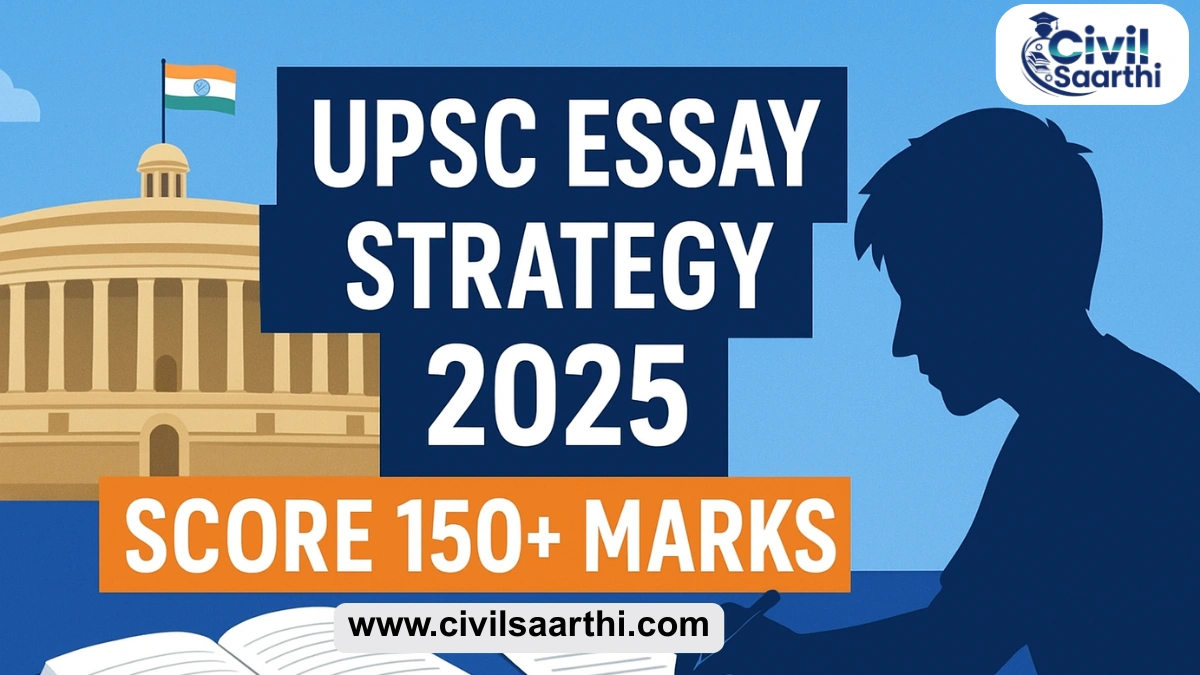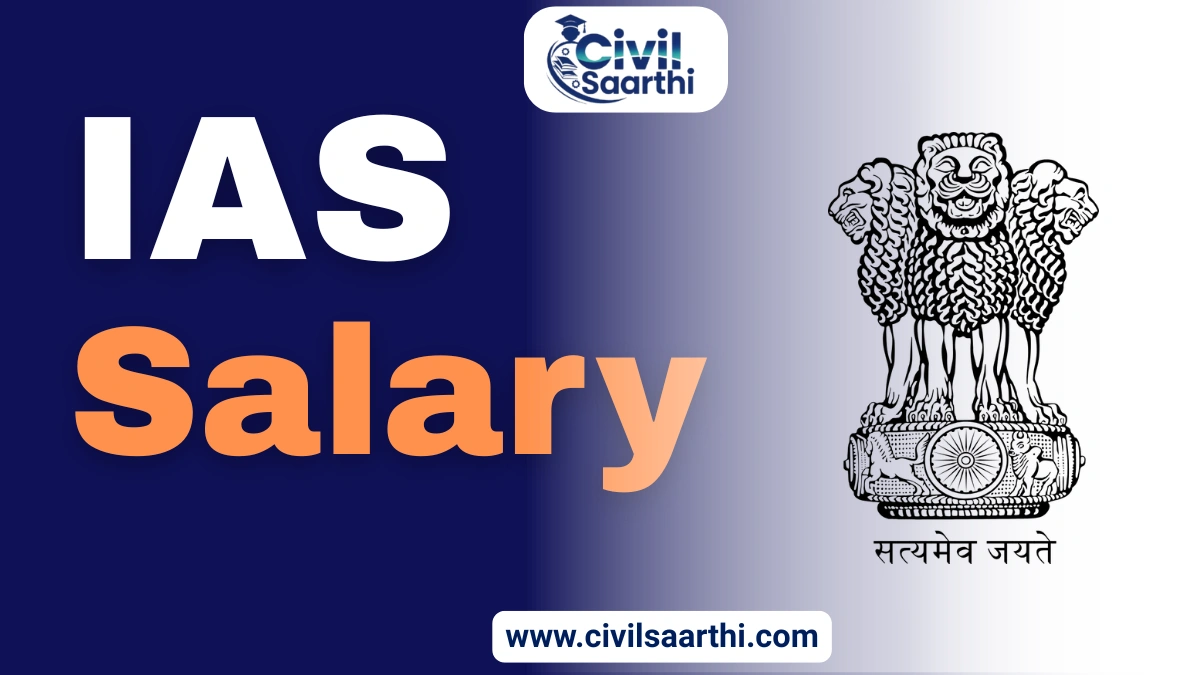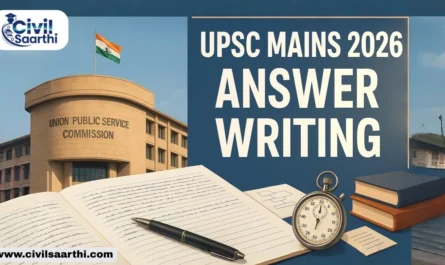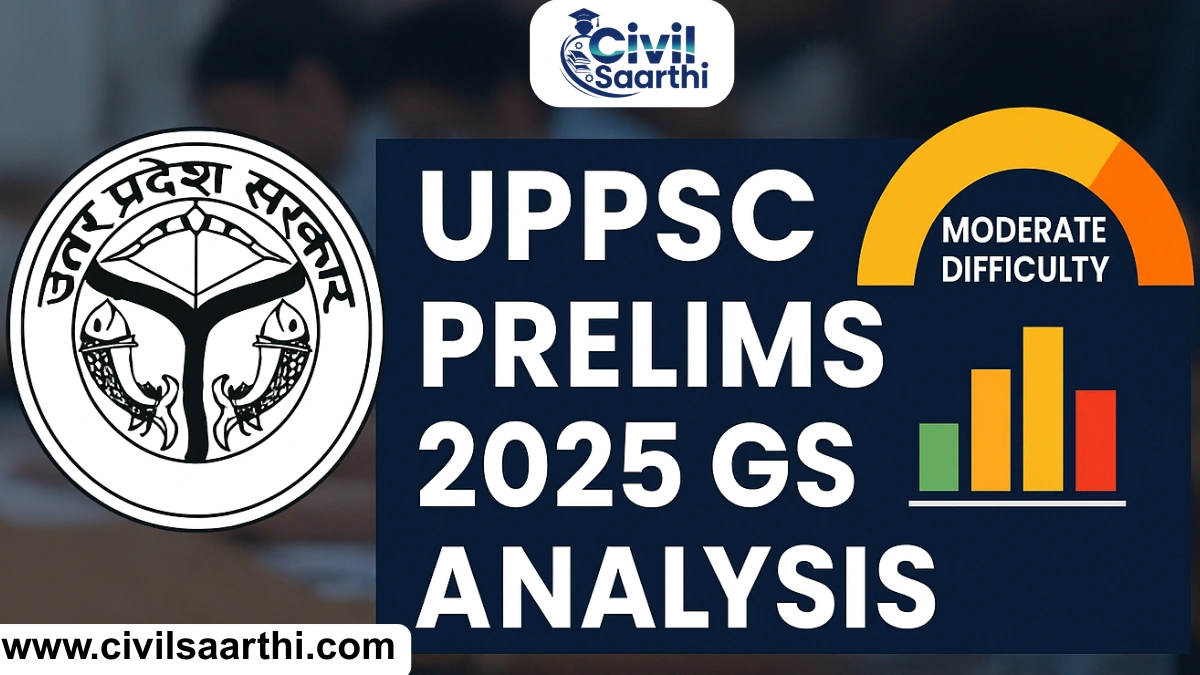The Essay Paper in UPSC Mains Examination is often seen as unpredictable but it is also one of the most rewarding. Many aspirants ignore it during preparation, assuming that good knowledge from General Studies will automatically help. But in reality, essay writing requires a unique blend of knowledge, structure, creativity, and balance.
A well-written essay can push your score by 20–30 marks compared to other candidates, which can be the difference between securing IAS or missing the list. In this article, we will break down a step-by-step UPSC essay strategy, common mistakes, toppers’ insights, and practice tips to help you write essays like a topper.
UPSC Essay Paper: Overview
The Essay Paper is part of UPSC Mains Examination and carries 250 marks. It consists of two sections (A and B), each with four essay topics. Candidates must attempt one essay from each section, writing 1000–1200 words per essay in a duration of 3 hours.
| Feature | Details |
|---|---|
| Total Marks | 250 |
| Sections | 2 (A & B) |
| Topics per Section | 4 |
| Essays to Write | 2 |
| Word Limit per Essay | 1000–1200 |
| Duration | 3 Hours |
| Marking Criteria | Content, Coherence, Language, Balance of Opinion |
This paper is not just about facts, but also about analysis, balance, writing clarity, and optimism.
Why the UPSC Essay Paper is Important
High Scoring Potential: Many toppers score 150+ in essays, which compensates for lower scores in optional or GS.
Reflects Personality: UPSC expects aspirants to write with maturity, optimism, and balance. Your essay reflects how you think, not just what you know.
Less Resource-Intensive: Unlike GS or optional, you don’t need bulky books. A disciplined practice routine and wide reading habit are enough.
Game Changer: A jump from 100 to 150 marks in essays can change your overall rank drastically.
Qualities of a Good UPSC Essay
A high-scoring essay in UPSC has the following qualities:
1. Clarity of Thought
The examiner must understand your argument without confusion. Avoid vague statements and repetitive arguments.
2. Balanced Perspective
Do not take extreme positions. Present multiple sides before forming a conclusion. For example, in an essay on globalization, show both opportunities and challenges.
3. Multi-Dimensional Approach
Always include social, political, economic, ethical, cultural, environmental, and international aspects. This shows maturity of thought.
4. Coherence & Flow
Paragraphs should connect like a story. Each argument must logically lead to the next.
5. Language Simplicity
UPSC does not reward ornamental English. Use simple, clear, and dignified language.
6. Optimistic Conclusion
End on a positive, forward-looking note, often linked with Constitutional values, SDGs, or Indian ethos.
How to Choose the Right Essay Topic
Many aspirants fail at the very first step, choosing the right topic. Here’s a strategy:
Pick the topic that you can sustain for 1000–1200 words.
Ensure you can cover it from multiple perspectives.
Avoid extremely abstract topics unless confident (e.g., “Reality does not conform to the ideal, but confirms it”).
Prefer topics linked with governance, ethics, or current affairs, as they allow wider coverage.
Example: In 2020, aspirants had to choose between topics like “Life is long journey between human being and being humane” (philosophical) and “Technology as the silent factor in international relations” (current affairs based). A balanced candidate usually scores better in the latter unless they are strong in philosophy.
Step-by-Step UPSC Essay Writing Strategy
Step 1: Analyze the Topic
Spend 10–15 minutes brainstorming before writing. Break down the key terms and understand what the topic demands.
Example: If the topic is “History repeats itself, first as tragedy, second as farce”, think of examples from world history, India’s freedom struggle, and contemporary politics.
Step 2: Draft a Structure
Every essay must have three parts:
Introduction – 10% of essay
Body – 80% of essay
Conclusion – 10% of essay
Step 3: Writing the Introduction
Your introduction must grab attention and set the tone.
Techniques to begin:
Start with a quote or proverb.
Use a real-life story or anecdote.
Begin with a current affairs example.
Define the core idea of the topic in simple words.
Example (Topic: “Wisdom finds truth”):
“Einstein once said, ‘Wisdom is not a product of schooling, but of the lifelong attempt to acquire it.’ This statement captures the essence of how societies evolve towards truth.”
Step 4: Developing the Body
This is where you score the most. Divide into themes or dimensions:
Historical – Past lessons.
Political – Governance, democracy, leadership.
Economic – Growth, inequality, reforms.
Social – Society, gender, caste, culture.
Ethical – Morality, justice, values.
Global – International relations, geopolitics.
Ensure smooth transitions between paragraphs. Use connectors like “Another dimension to consider is…” or “From the social perspective…”.
Step 5: Conclusion Writing
The conclusion must be optimistic, future-oriented, and inspiring. Avoid negativity.
Example (Topic: “Technology shapes the future”):
“Technology is neither a curse nor a blessing in itself; it is what humanity makes of it. Guided by ethics, inclusiveness, and sustainability, technology can become the greatest enabler of human progress in the 21st century.”
Toppers’ Insights on Essay Writing
Anudeep Durishetty (AIR 1, 2017): Focus on balance, avoid clutter, and maintain simple language.
Tina Dabi (AIR 1, 2015): Always add personal touch and optimism.
Gaurav Agarwal (AIR 1, 2013): Link abstract topics with practical realities.
Practice Strategy for Essay Paper
Write one essay per week during preparation.
Practice both philosophical and current affairs topics.
Get feedback from mentors or test series.
Maintain a notebook of quotes, anecdotes, data, and examples.
Read editorials, Yojana, Kurukshetra, and NITI Aayog reports for diverse perspectives.
Common Mistakes to Avoid
Misinterpreting the topic – Writing off-track.
One-dimensional essays – Only social or only economic arguments.
Using bullet points – Always write in paragraphs.
Data dumping – Statistics without analysis don’t fetch marks.
Weak conclusion – Ending abruptly or negatively.
Example Essay Outline (Topic: “Education is the most powerful weapon to change the world”)
Introduction: Quote by Nelson Mandela → Define education as transformative force.
Body:
Historical: Role of education in India’s freedom struggle.
Political: Democracy depends on informed citizens.
Economic: Skilled workforce drives growth.
Social: Gender equality, social justice, empowerment.
Global: Education as soft power in diplomacy.
Ethical: Education builds values and compassion.
Conclusion: Education as foundation for India’s future → align with SDGs, Constitution, and Vasudhaiva Kutumbakam.
Final Takeaway
The UPSC Essay Paper is not about flowery English or heavy vocabulary, but about clarity, coherence, balance, and maturity. A good essay demonstrates that you can think like a future civil servant—objective, optimistic, and inclusive.
With regular practice, multi-dimensional thinking, and structured writing, aspirants can easily score 140–160+ and turn this paper into a rank booster.
UPSC Mains Essay Paper FAQs
1. How many essays are asked in the UPSC Mains Essay Paper?
Aspirants need to write two essays – one from each section (A & B). Each essay carries 125 marks, making a total of 250 marks.
2. What is the word limit for UPSC essays?
Each essay should be around 1000–1200 words. Writing too short or exceeding the limit significantly may impact marks.
3. How should I start an essay in UPSC?
The introduction should be engaging yet simple. You can begin with a relevant quote, a real-life example, or a contextual definition of the topic.
4. Can we use quotes and poems in UPSC essays?
Yes. Relevant quotes, poems, and anecdotes enrich your essay. But avoid overusing them—clarity and analysis matter more.
5. Should essays be written in bullet points?
No. UPSC expects paragraph-style essays. Bullet points look like GS answers and may reduce marks.
6. What topics are generally asked in UPSC essays?
Topics are mostly from philosophy, governance, social issues, environment, women, education, science & technology, and ethics. They can be abstract or current affairs-based.
7. What is the best way to practice for the essay paper?
Write at least one essay per week, get it evaluated, and focus on multi-dimensional analysis. Reading newspapers, Yojana, Kurukshetra, and NITI Aayog reports helps.
8. How many marks are considered good in the essay paper?
A score of 140–150+ is considered excellent. Many toppers cross this mark and gain a decisive edge in the final list.







